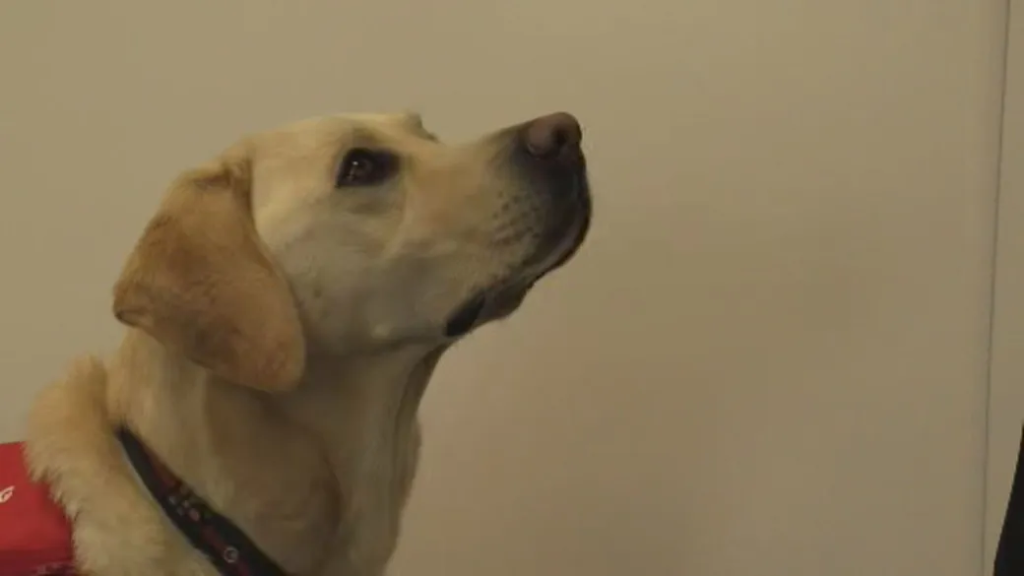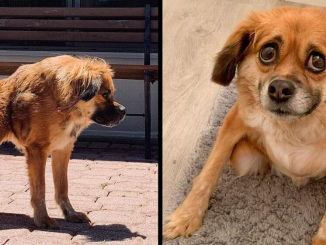
As the availability of COVID-19 tests dwindle across Canada, another option to detect the virus in the form of a furry friend may be the next best thing.
Multiple studies show that dogs can be more effective, faster and potentially less expensive than the current tests on the market.
The research has grown since 2020, with University of California Santa Barbara professor Tommy Dickey finding the collective research shows trained scent dogs are “as effective and often more effective” than both the rapid antigen tests many people keep in their homes, and even the PCR tests deployed at clinics and hospitals.
But even with studies showing their effectiveness, COVID-19-detecting dogs are deployed only in certain jurisdictions in various countries.
One such place is the Canines for Care program at Vancouver Coastal Health (VCH), which started looking into the possibility of training dogs to detect COVID-19 in early 2021.
Dr. Marthe Charles, division head of medical microbiology and infection prevention and control at VCH, said the idea stemmed from the early reliance on laboratory testing.
“I think there was a will from public health at the time and also from the various levels of government to try to find a way that was fast, accurate and non-invasive to be able to detect and train as many people as possible,” Charles told Global News in an interview.
Three dogs — two Labrador retrievers and an English springer spaniel — were brought in for training. The dogs were exposed to items such as masks that were worn by patients either negative or positive for the virus. This trained the dogs to recognize what is and is not COVID-19.

Charles said the dogs were trained since being puppies to associate the scent of COVID-19 with food and were rewarded each time they correctly detected a positive case of the virus.
“So from early on in their lives, they’ve associated the scent of a case of COVID to a rewarding scent,” she explained.
This reward method is not just used by VCM. It was also used with a group of dogs sourced in early 2021 for a French study, trained at detection using toys — usually tennis balls — as rewards.
Dr. Carla Simon, owner of Hunter’s Heart Scent Detection Canines in Calgary, said this method of training dogs is common. By using rewards, it can help motivate them to find the scent.
“We would pair, let’s say, the sweat samples with COVID, with their reward, and they notice that every time they find their reward, there’s that special smell,” she explained. “We just have to make it rewarding for the dog.”
She added, however, that the dog chooses the reward so trainers can ensure the canines “show up every day and want to do their job.”
Earlier this month, Dickey along with Heather Junqueira of BioScent, Inc. gathered several peer-reviewed studies into a review that was published in the Journal of Osteopathic Medicine. Dickey said the number of peer-reviewed studies over the past few years went from four to 29, incorporating the work of more than 400 scientists from more than 30 countries and 31,000 samples.
The review noted the effectiveness of dogs’ ability to detect COVID-19 comes down to their noses.

“The nose is not like humans,” Simon said. “It’s massively different, orders of magnitude different, and they can detect things without us being able to smell them.”
Humans have about five to six million olfactory receptors in their noses, while dogs have hundreds of millions. One-third of their brain is devoted to the interpretation of smell — something only five per cent of a human’s brain is committed to, according to Dickey’s review.
The study found dogs’ noses may even be able to detect pre-symptomatic COVID-19 cases, or even those who will develop symptoms later.
Dickey told us in an interview that this could help limit or stop the virus from spreading.
“The longer the wait is between your test and your result, that’s a latent period,” he said. “During that time you’re running around spreading COVID and you don’t know it. The dogs with a direct sniff will be done in seconds.”
Many of the studies conducted, including the work at VCH through the Canine for Care program, have shown dogs’ ability to detect the disease correctly with a success rate of more than 90 per cent. Additionally, the studies also showed a high speed at which the dogs could identify cases. In one study in Thailand, researchers reported the dogs had gone through thousands of samples in just a few weeks.
“The dogs take only one to two seconds to detect the virus per sample. Once they detect a patient, they will sit down,” said Chulalongkorn University professor Kaywalee Chatdarong, who led the 2021 project. “This takes only one to two seconds. Within one minute, they can manage to go through 60 samples.”
Even though the research suggested deploying scent-detection dogs could also be less expensive than rapid or PCR tests, Charles cautioned the logistics that go into training the dog is where it becomes “more prohibitive.”

In VCH’s case, training of the dogs included the medical microbiology lab to provide samples for use, working with infection prevention teams and control nurses, and if a dog identifies an area of concern, cleaning services may need to be utilized. And when it comes to rolling out testing using the dogs, enough staffing is needed for mass screening.
Despite this, while Charles says deploying the dogs widely could be difficult due to staffing and training, they are still one of several tools that can be used in COVID-19 detection.
“I think the way to see those dogs from my perspective is really like another tool in the toolbox and trying to prevent further transmission of pathogen of concern,” she said.
Dickey and Junqueira say dogs should have a place in “serious diagnostic methodology” including in helping should the world face a future pandemic.
Abandoned And Trapped In Deep River, The Elderly Dog started crying When The Volunteer Approached To Caress Him
In the heart of Los Angeles, a tale unfolded that touched the souls of many—a tale of abandonment, resilience, and compassion. It began with a simple phone call, one that sparked a mission of hope and redemption for a lonely soul trapped in the depths of the city’s river.

The call came to Hope in the Paws, a beacon of light for animals in distress. On the other end of the line was a plea for help, a desperate cry for assistance for an elderly dog stranded in the labyrinthine maze of the Los Angeles River. For weeks, the community had rallied around the dog, providing what little sustenance they could offer, but they knew that without intervention, his fate would be sealed.

With urgency in their hearts and determination in their eyes, the volunteers of Hope in the Paws sprang into action. But as they approached the river’s edge, they were met with a sight that tugged at their heartstrings—the elderly dog, once proud and majestic, now reduced to a trembling, frightened creature, his eyes betraying the fear and uncertainty that gripped his soul.

Undeterred by the enormity of the task before them, the volunteers pressed on, fueled by a singular purpose—to bring comfort and salvation to this vulnerable being. With each step closer, they could hear the soft whimpering of the dog, a haunting melody that echoed through the silence of the river.

But then, something miraculous happened. As one of the volunteers extended a hand of kindness towards the dog, offering nothing but love and compassion, the trembling ceased, and the fear began to ebb away. In that moment, amidst the chaos and turmoil of the river, a bond was formed—a bond forged in the crucible of adversity and sealed with the simple yet profound language of empathy.

With gentle hands and tender words, the volunteers lifted the elderly dog from his watery prison, cradling him in their arms as they made their way to safety. And as they emerged from the depths of the river, they were greeted by the warm embrace of the community, their faces alight with gratitude and hope.
The rescue of Peggy the German Shepherd was not just a triumph of human kindness—it was a testament to the power of compassion and the resilience of the human spirit. And as Peggy took her first tentative steps towards a new life, she carried with her the unwavering support of all those who had rallied behind her—a reminder that no soul is ever truly alone as long as there are hearts willing to open and hands ready to help.
So here’s to Hope in the Paws, an organization built on the belief that every life is worth saving and every creature deserving of love. Thank you for your tireless dedication, your boundless compassion, and your unwavering commitment to making the world a better place—one rescue at a time.
And to Peggy, may your journey be filled with warmth and joy, and may you always know that you are loved beyond measure. You may have been abandoned and trapped in the depths of a river, but today, you are free—free to run, free to play, and free to bask in the boundless love that surrounds you.
This is the story of Peggy the German Shepherd—a story of hope, redemption, and the enduring power of love. And as her tale spreads far and wide, may it serve as a beacon of hope for all those who find themselves lost and alone in the world.



Leave a Reply